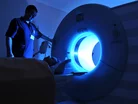Post-COVID-19 diagnostics and financing digital healthcare

Last summer the healthcare media was dominated with articles about the post-COVID-19 diagnostics world. Outlets published on what they termed “a new dawn” and generally hopeful commentators looked to the future of the healthcare sector despite the continuation of Coronavirus in the present. In keeping with the diagnostic process itself, here I take a holistic view of the changing state of diagnostic healthcare to determine the increasing importance of digital transformation to meet rising demand and improve patient outcomes.
Pre-COVID-19 – an initial diagnostic assessment
Escalating demand for healthcare – particularly for chronic conditions – already meant that focusing simply on symptomatic treatment was rapidly becoming unaffordable. To prevent the need for costly lifelong treatment, health authorities required modern, usually digitalised, technologies that could spot disease indicators very early. This made digital transformation an urgent imperative to create healthier societies that consume less healthcare.
Indeed, the 2019 report Priority Investment pointed to the urgent need pre-COVID-19 to invest in new generation (mobile and digitalised) diagnostics. Healthcare experts identified diagnostics as one of the areas which held the highest potential for rapid positive impact on pressurised healthcare infrastructures and operations. However, the hurdle to investment was typically the considerable capital required. Two years on, the need is arguably greater than ever, but the financial barrier persists.
Penny Pinnock, Sales Manager, Healthcare & Public Sector for Siemens Financial Services
Digital healthcare technology evolved over COVID-19
Digital and remote diagnostic healthcare technologies have more than proved their value in the pandemic crisis. Whether for teleconsultations, infection control via smart buildings, artificial intelligence helping clinicians make quicker/better decisions, or mobile diagnostic services in the community there are countless examples.
The most obvious perhaps, the COVID-19 pandemic has highlighted the need for better testing capabilities. Testing is fundamental in combating the spread of the virus but in order to meet demand capacity needs to expand in tandem.
Similarly mobile diagnostic units are increasingly playing a supporting role. Relocatable new-generation MRI units can enable NHS and private healthcare clinics to support patients and provide access in high-demand or in isolated areas. The latest technologies enable a higher throughput of patients per day without compromising on image quality.
The acquisition of digitalised diagnostic equipment is crucial to the fight against COVID-19, but what about post-COVID-19?
Post-COVID-19 ongoing treatment and follow up
For healthcare to modernise and deliver increasing value to society post-COVID-19, an upfront investment is required to transform care delivery, expand access to precision medicine and improve patient experiences and outcomes. Healthcare providers need to invest in new-generation, digitalised equipment and technology that is critical to improving diagnostic accuracy and productivity, precision medicine interventions, remote access to healthcare, and much more. Siemens Financial Service (SFS) works with Siemens Healthineers, as well as other technology vendors, to provide cost effective financing solutions for a wide variety of medical technology and equipment, enabling healthcare organisations to access the solutions they need without having to commit precious capital budgets.
Smart financing enables the acquisition of technology and equipment for competitive advantage, in a way that is financially sustainable and tailored to the organisation’s specific business and cash-flow needs.
Smart financing offers three major advantages over generalist finance:
- Technology expertise leverages deep understanding of the technology and how it is applied in practice, plus the benefits & return on investment it delivers in real-world applications
- Breadth of financing solutions offers a true spectrum of financing products and solutions which can be flexed and customised to fit each organisation's individual circumstances
- Smooth processes put customer experience front and centre – delivering speed and ease, supported by digital tools, techniques and specialist sector experts
Healthcare financiers who have an in-depth understanding of healthcare technology and its applications can provide these tailored financing packages. SFS provides cost effective financing solutions for a wide variety of medical equipment and technology, enabling healthcare organisations to acquire the solutions they need without having to commit precious capital budgets.
Many commentators have noted how the pandemic crisis has highlighted the value of digitalisation in healthcare, and are predicting the likely acceleration of digital transformation in health systems across the world to revolutionise care delivery and reshape the patient experience. While embracing innovation and new technologies has been an essential part of the current fight against COVID-19, their importance in the future of healthcare is certain. As digital transformation has accelerated, so too has the growing importance of “smart” finance to make this transition both possible and financially sustainable.
Byline written by Penny Pinnock, Sales Manager, Healthcare & Public Sector for Siemens Financial Services



